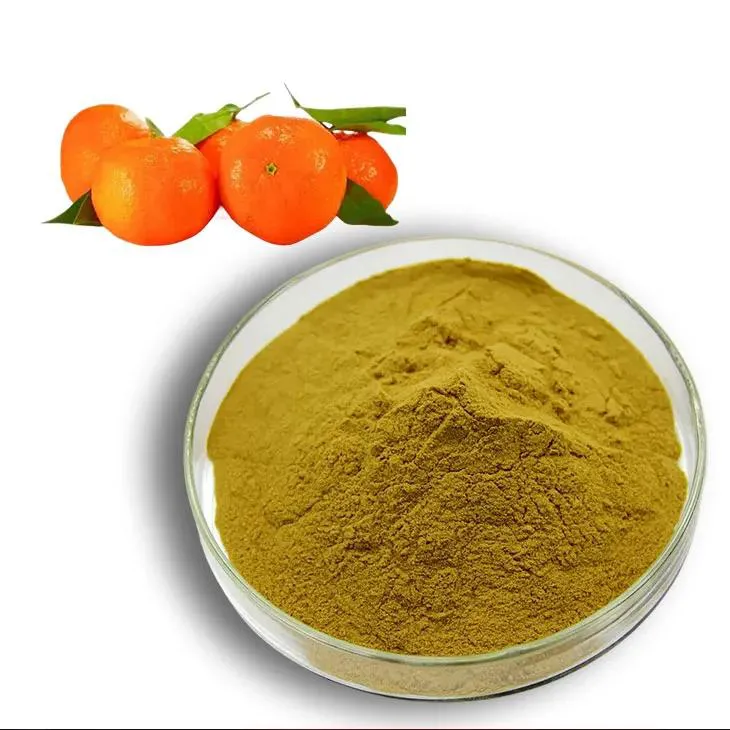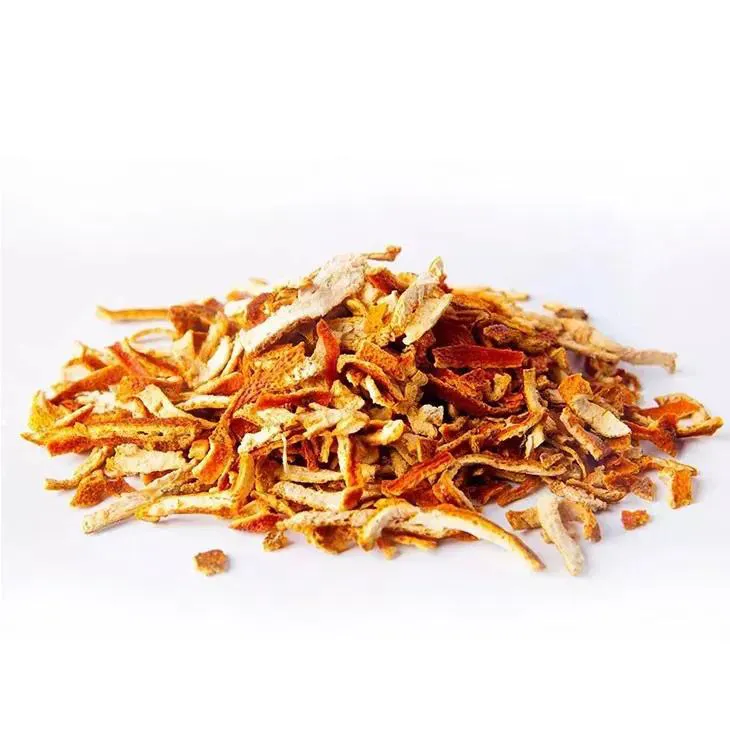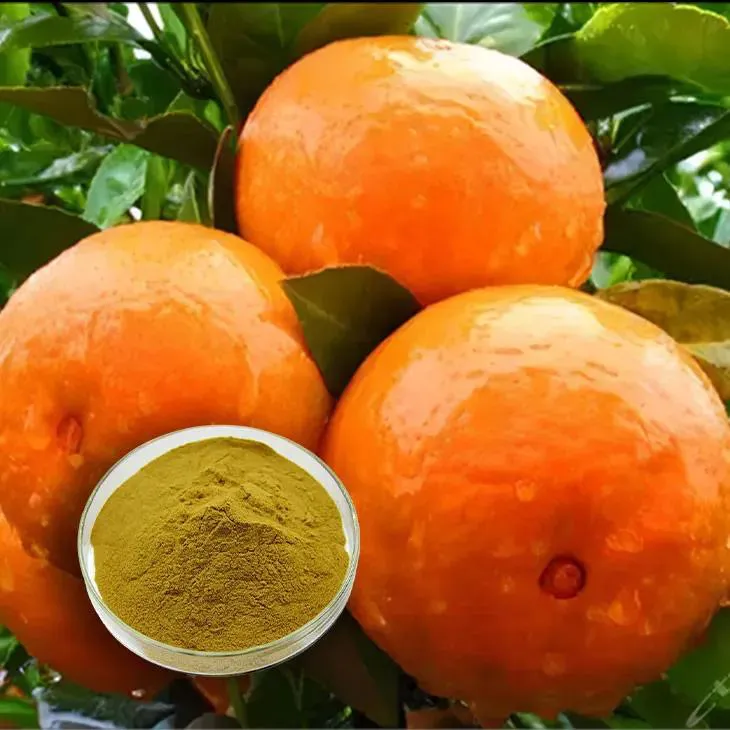- 0086-571-85302990
- sales@greenskybio.com
Prevent diseases and strengthen immunity with citrus bioflavonoids.
2024-11-12

1. Introduction to Citrus bioflavonoids
Citrus bioflavonoids are a group of natural compounds found in citrus fruits such as oranges, lemons, and grapefruits. These compounds are not only responsible for the color of the citrus fruits but also possess a wide range of health - beneficial properties. They are polyphenolic substances that have been studied extensively for their potential in promoting health and preventing diseases.

2. Antioxidant Properties of Citrus bioflavonoids
2.1 Free Radicals and Oxidative Stress
In the human body, normal metabolic processes as well as exposure to environmental factors such as pollution, radiation, and certain chemicals generate free radicals. Free radicals are highly reactive molecules with unpaired electrons. When present in excessive amounts, they can cause oxidative stress, which is linked to various diseases including cancer, heart disease, and neurodegenerative disorders.
2.2 How Citrus Bioflavonoids Act as Antioxidants
Citrus bioflavonoids have the ability to neutralize free radicals. They do this by donating electrons to the free radicals, thereby stabilizing them and preventing them from causing damage to cells and tissues. For example, flavonoids like Hesperidin and naringin found in citrus fruits are effective antioxidants. These compounds can scavenge free radicals in the body, reducing oxidative stress levels. This antioxidant activity is crucial for maintaining the overall health of the body.
3. Anti - Inflammatory Effects of Citrus Bioflavonoids
3.1 Inflammation and Chronic Diseases
Inflammation is a natural immune response in the body that helps to fight off infections and heal injuries. However, chronic inflammation can be a problem. It is associated with a host of chronic diseases such as arthritis, diabetes, and inflammatory bowel diseases. Chronic inflammation occurs when the immune system is constantly activated, leading to the release of pro - inflammatory mediators like cytokines.
3.2 Mechanisms of Anti - Inflammatory Action
Citrus bioflavonoids can modulate the inflammatory response in the body. They can inhibit the production of pro - inflammatory cytokines, thereby reducing inflammation. For instance, some bioflavonoids have been shown to block the activation of certain signaling pathways involved in inflammation, such as the NF - κB pathway. By doing so, they can prevent the over - activation of the immune system and the subsequent development of chronic inflammation - related diseases.
4. Role in Disease Prevention
4.1 Cardiovascular Disease Prevention
Citrus bioflavonoids play an important role in preventing cardiovascular diseases. They can improve blood vessel function by promoting the production of nitric oxide, which helps to relax blood vessels and reduce blood pressure. Additionally, their antioxidant and anti - inflammatory properties can prevent the oxidation of low - density lipoprotein (LDL) cholesterol, which is a major risk factor for heart disease. By reducing oxidative stress and inflammation in the blood vessels, citrus bioflavonoids can lower the risk of developing atherosclerosis and other cardiovascular problems.
4.2 Cancer Prevention
The antioxidant and anti - inflammatory properties of citrus bioflavonoids also contribute to cancer prevention. Free radicals can cause damage to DNA, which may lead to mutations and the development of cancer. By scavenging free radicals, citrus bioflavonoids can protect DNA from damage. Moreover, their anti - inflammatory effects can help to create an environment in the body that is less conducive to the growth and spread of cancer cells. Some studies have also suggested that certain bioflavonoids may directly inhibit the growth of cancer cells by interfering with their cell cycle or inducing apoptosis (programmed cell death).
4.3 Prevention of Neurodegenerative Diseases
In neurodegenerative diseases such as Alzheimer's and Parkinson's, oxidative stress and inflammation play significant roles in the progression of the diseases. Citrus bioflavonoids, with their antioxidant and anti - inflammatory capabilities, can potentially protect neurons from damage. They may also help to improve cognitive function by enhancing blood flow to the brain and reducing the formation of amyloid plaques, which are characteristic features of Alzheimer's disease.5. Boosting the Immune System with Citrus Bioflavonoids
5.1 The Immune System and Health
The immune system is a complex network of cells, tissues, and organs that defends the body against pathogens such as bacteria, viruses, and fungi. A strong immune system is essential for maintaining good health. When the immune system is weakened, the body becomes more susceptible to infections and diseases.
5.2 How Citrus Bioflavonoids Strengthen the Immune System
Citrus bioflavonoids can enhance the immune system in several ways. Firstly, their antioxidant properties protect immune cells from oxidative damage, ensuring that these cells can function properly. Secondly, they can stimulate the production of immune - enhancing cytokines, which are important signaling molecules in the immune response. Additionally, some bioflavonoids have been shown to increase the activity of natural killer cells, which are a type of white blood cell that plays a key role in the body's defense against viruses and cancer cells.6. Sources of Citrus Bioflavonoids
6.1 Citrus Fruits
As mentioned earlier, citrus fruits are the primary source of citrus bioflavonoids. Oranges, lemons, grapefruits, and tangerines are all rich in these beneficial compounds. For example, oranges contain significant amounts of Hesperidin, while lemons are a good source of eriocitrin. Eating fresh citrus fruits is an excellent way to obtain citrus bioflavonoids.
6.2 Citrus - Based Products
In addition to fresh fruits, there are also various citrus - based products that can provide citrus bioflavonoids. Citrus juices, whether freshly squeezed or commercially processed (without added sugars), are a convenient source. Citrus extracts and supplements are also available in the market. However, when choosing supplements, it is important to ensure their quality and safety.7. Recommended Intake and Precautions
7.1 Recommended Dietary Intake
There is no official recommended daily intake specifically for citrus bioflavonoids at present. However, consuming a variety of citrus fruits as part of a balanced diet can ensure an adequate intake of these compounds. For most people, eating 1 - 2 servings of citrus fruits per day can provide a good amount of bioflavonoids.
7.2 Precautions
While citrus bioflavonoids are generally safe for most people, some individuals may experience allergic reactions, especially those who are allergic to citrus fruits. Additionally, if taking citrus bioflavonoid supplements, it is important to follow the recommended dosage and consult a healthcare professional, especially if you have any underlying medical conditions or are taking other medications, as there may be potential interactions.8. Conclusion
Citrus bioflavonoids offer a wide range of health benefits, from disease prevention to immune system strengthening. Their antioxidant and anti - inflammatory properties make them valuable in protecting the body against various diseases such as cardiovascular diseases, cancer, and neurodegenerative disorders. By incorporating citrus fruits or citrus - based products into our diet, we can take advantage of these beneficial compounds. However, it is also important to be aware of any potential precautions and consult a healthcare professional when necessary. Overall, citrus bioflavonoids are a natural and promising way to promote health and well - being.
FAQ:
What are citrus bioflavonoids?
Citrus bioflavonoids are a group of compounds found in citrus fruits such as oranges, lemons, and grapefruits. They are known for their antioxidant, anti - inflammatory, and other beneficial properties.
How do citrus bioflavonoids prevent diseases?
They prevent diseases mainly through their antioxidant and anti - inflammatory effects. The antioxidant property helps neutralize free radicals in the body, which can damage cells and lead to various diseases. The anti - inflammatory effect can reduce chronic inflammation in the body, which is associated with many health problems like heart disease and arthritis.
Can citrus bioflavonoids really boost immunity?
Yes, they can. They support the immune system by enhancing the function of immune cells. For example, they can help white blood cells function more effectively in fighting off pathogens, thus strengthening the body's overall immunity.
What are the best sources of citrus bioflavonoids?
The best sources are fresh citrus fruits. Orange peel, in particular, is rich in bioflavonoids. Citrus juices can also be a good source, but be aware that some commercial juices may have added sugars. Dried citrus peels can also be used in cooking or making teas to obtain these beneficial compounds.
Are there any side effects of consuming citrus bioflavonoids?
When consumed in normal amounts from food sources, there are usually no side effects. However, if taken in large amounts in supplement form, it may cause some gastrointestinal discomfort, such as nausea or diarrhea in some individuals. Also, people with citrus allergies should avoid citrus bioflavonoid supplements.
Related literature
- The Role of Citrus Bioflavonoids in Health and Disease"
- "Citrus Bioflavonoids: A Review of Their Antioxidant and Anti - Inflammatory Properties"
- "Bioflavonoids from Citrus Fruits: Potential Benefits for Immune Function"
- ▶ Hesperidin
- ▶ Citrus Bioflavonoids
- ▶ Plant Extract
- ▶ lycopene
- ▶ Diosmin
- ▶ Grape seed extract
- ▶ Sea buckthorn Juice Powder
- ▶ Fruit Juice Powder
- ▶ Hops Extract
- ▶ Artichoke Extract
- ▶ Mushroom extract
- ▶ Astaxanthin
- ▶ Green Tea Extract
- ▶ Curcumin
- ▶ Horse Chestnut Extract
- ▶ Other Product
- ▶ Boswellia Serrata Extract
- ▶ Resveratrol
- ▶ Marigold Extract
- ▶ Grape Leaf Extract
- ▶ New Product
- ▶ Aminolevulinic acid
- ▶ Cranberry Extract
- ▶ Red Yeast Rice
- ▶ Red Wine Extract
-
Curcuma Longa Extract
2024-11-12
-
Rose Hip Extract
2024-11-12
-
Bamboo Leaf extract
2024-11-12
-
Honeysuckle Pollen
2024-11-12
-
Maca Extract
2024-11-12
-
Saffron Extract Powder
2024-11-12
-
Hesperidin
2024-11-12
-
Bayberry Extract
2024-11-12
-
Moringa powder
2024-11-12
-
Ginseng Root Extract
2024-11-12





















